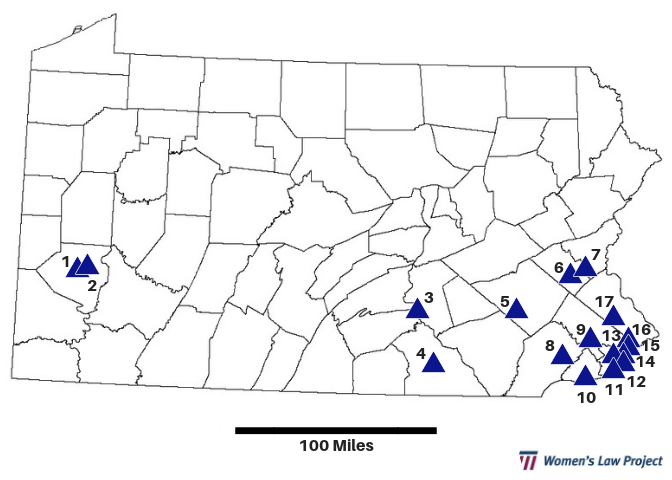
Map of abortion providers in Pennsylvania in 2020.
We are at a crossroads.
As we observe the 47th anniversary of landmark U.S. Supreme Court decision Roe v. Wade today, we do so amid widespread political attacks on reproductive rights, health, and justice.
Abortion itself is not controversial. Most Americans value personal autonomy over government interference and believe reproductive decisions should be left up to families, not politicians.
Unfortunately, many of our politicians have not been working on behalf of the beliefs, health, and freedom of the American people. Instead, they pander to well-financed special interests devoted to pushing the United States back into the dark ages, low-income and rural Americans in need of abortion care back into emergency rooms, and physicians who choose to serve their patients over politicians into prison.
An avalanche of federal and state-level restrictions has gutted access to abortion for many low-income people, women of color, and rural communities, even as Roe still stands.
In the 1970s, Pennsylvania had approximately 145 abortion providers.
Today, only 17 are left.
Of those, five only offer medication abortion.
In many parts of Pennsylvania, a patient must drive hours to obtain abortion care, an obstacle that can delay the procedure which can increase cost and deprive the patient of choice regarding type of procedure. Pennsylvania enforces a medically unnecessary 24-hour waiting period and forces doctors to read a government-mandated “informed consent” script that contains 24% medically inaccurate statements.
There are many more. Currently, at least 1,238 pages of statutes, regulations, and policies govern abortion care in Pennsylvania.
For Pennsylvania’s radical anti-choice lawmakers, it’s still not enough.
This past fall, the Pennsylvania Legislature organized a blitz of five abortion restrictions, including a Pence-inspired bill terrible enough to earn national attention.
The primary strategy of anti-choice Pennsylvania lawmakers, members of the second highest-paid Legislature in the country, is targeting low-income constituents to deprive us of our reproductive freedom. It’s not difficult to conclude that one of the reasons some of the very same lawmakers obsessed with abortion access have refused to raise the minimum wage in Pennsylvania—at $7.25 per hour, the lowest in the country–is to perpetuate poverty in order to maintain reproductive control.
Pennsylvania also targets abortion with funding bans. Currently, Pennsylvania bans Medicaid coverage of abortion care expect in limited cases, though we are currently litigating seeking to lift this discriminatory ban.
In addition to the Medicaid ban, Pennsylvania lawmakers passed a law prohibiting families from purchasing private insurance through the exchange to cover pregnancy termination even when the health of the pregnant woman is at stake.
Despite these funding bans, Pennsylvania funnels millions of taxpayer dollars into so-called “crisis pregnancy centers” (CPCs) annually, and even diverts money from Temporary Assistance for Needy Families into their coffers, despite evidence of a lack of financial accountability and failure to fulfill contracts in other states.
It doesn’t have to be this way.
Some states are passing laws to protect equal access to safe legal abortion care. In the first half of 2019, New York, Rhode Island, Vermont, Illinois, Maine, and Nevada passed laws that would protect abortion if the U.S. Supreme Court ever overruled Roe v. Wade and that will expand its accessibility in very concrete ways.
Meanwhile in Pennsylvania, anti-choice lawmakers are blocking repeatedly introduced legislation that would improve maternal and children’s health. For years, Pennsylvania anti-choice lawmakers have blocked a bill designed to reduce miscarriages and prenatal injuries (PA Pregnant Workers Fairness Act) and legislation to decrease infant mortality (Workplace Accommodations for Nursing Mothers).
The fact that abortion restrictions are about nothing more than attempting to control people’s reproductive choices is never clearer than when watching the Pennsylvania Legislature.
What can you do?
Commit to speaking up. When you hear about a dangerous abortion restriction from our action alerts or the news, commit to contacting state lawmakers and expressing your opposition.
Contact your House Representative and urge them to support the PA Pregnant Workers Fairness Act and Workplace Accommodations for Nursing Mothers.
Amplify calls to action.
When you read about abortion restrictions or reproductive rights in the news, write letters to the editor in response. (Have a question about this process? Contact WLP at tmurtha@womenslawproject.org.)
Write an op-ed to your local paper. (Have a question about this process? Contact WLP at tmurtha@womenslawproject.org.)
Watch this space for updates about June Medical Services v. Gee, the next big abortion rights case at the U.S. Supreme Court. WLP attorneys filed an amicus (“friend of the court”) brief in the case. Arguments are scheduled for March 4.
The Women’s Law Project is a public interest law center devoted to defending and expanding the rights of women, girls, and LGBTQ people in Pennsylvania and beyond.
Sign up for WLP’s Action Alerts. Stay up to date on issues and policy by following us on twitter liking us on Facebook and following us on Instagram.
We are a non-profit organization. Please consider supporting equal rights for women and girls by making a one-time donation or scheduling a monthly contribution.


